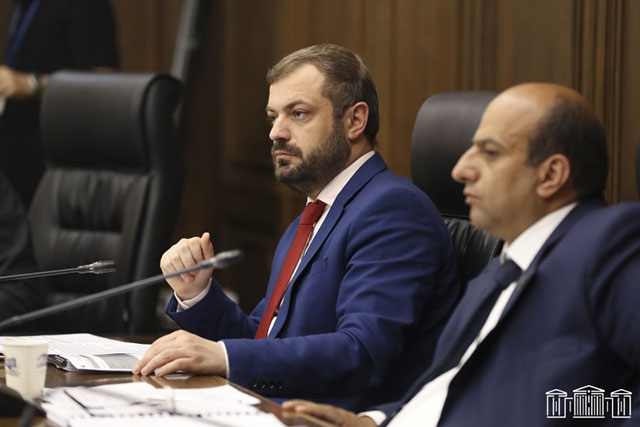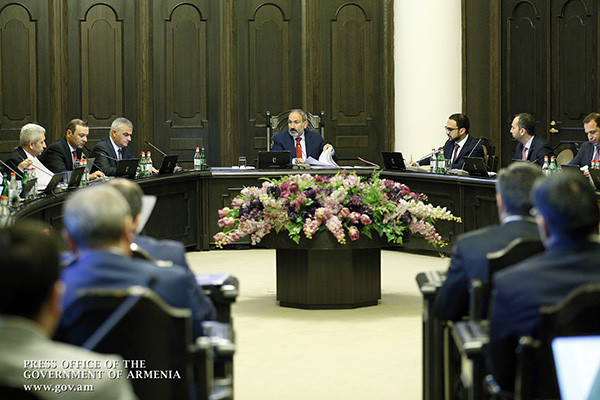“They proved once again that the public is ignored,” the preliminary deliberations on the Cabinet’s program made such an impression on Ararat Mkrtchyan, a former Minister of Economy, since the discussion of the Cabinet’s program, according to him, was held behind closed doors, in different branches of the government. To him, it is doubtful that the Cabinet’s program was submitted immediately after the order to form a Cabinet, “The old ministers, it is understandable, but the new ministers, it seems to me, haven’t participated in drawing up the program. There will be a gap in terms of taking responsibility for this program’s implementation.” Our interlocutor assesses the program itself as follows, “They have brought the forgotten Soviet pathos into the second decade of the 21st century.” The already adopted program of the new Cabinet, in the former minister’s assessment, almost doesn’t differ from the program of 2008-2012. He almost doesn’t see any new proposals, approaches and he is under the impression that this program “was written by a functionary, sitting in the Ministry of Economy, copy-pasting from here and there and stuffing into one document.” As opposed to the statements of the Republican Party of Armenia (RPA) members that the program was drawn up by combining the pre-election programs of the RPA and the Rule of Law Party (RLP), our interlocutor thinks that it is the program of the previous Cabinet seasoned with the RPA pre-election program. Moreover, in his opinion, the authors have mixed up a bit the conceptions of a pre-election program and the Cabinet’s program and the definitions are more in the format of a pre-election program. Ararat Mkrtchyan hasn’t even found logical coherence among the economic, financial, social and educational parts, “This program has been drawn up in a hurry, without preparations, discussions involving as many professional circles as possible.” He thinks that Prime Minister Tigran Sargsyan’s response to a question regarding the implementation mechanisms that they hadn’t wanted to submit a voluminous program is offensive, “So our respectful MPs would not have been able to read and comprehend it. The Prime Minister also said that they had tried to put forward the essentials. The Prime Minister said the right thing – these are essentials, this is not a program, but the Constitution stipulates that the Cabinet must submit a program, not essentials.”
Comparing the new and old documents more professionally, the former Minister of Healthcare notices that there are only partial provisions in that part of the program and there is no situational analysis based on statistical data, “They could have put forward at least a few essential indexes, which would have grounded the steps to be taken in the field of
healthcare. That also applies to the whole program – it is not clear what basic projects we have and how the steps provided for will improve the sphere.” Those who drew up the healthcare program, according to our interlocutor, are absolutely unaware of the global trends in healthcare, conferences on which are attended and the final documents of which are signed by the Republic of Armenia. The latest of which took place two months ago in Geneva, which was attended also by representatives of the Ministry of Healthcare of the Republic of Armenia. The former minister didn’t see any coherence among the steps proposed in the healthcare chapter either, but he thinks it is praiseworthy that the task of establishing a regional center of healthcare in Armenia was taken out of the previous Cabinet’s program. Instead, the only two indexes in the previous program – to increase the investment ratio to 15% and to increase the budget allocation in the field to 2.2% of GDP – were also taken out. Our interlocutor doesn’t think – even after all this – it is worth speaking of indicators of public health, “There is also no line that would mention improving the governance of the field. Whereas the system of government in the field of healthcare is at a very low level. There are different types of property and in terms of governance, we could have expected that the Cabinet would have at least laid the foundation of corporate governance. Those are fragmentary wishes – e.g., ‘let’s improve the affordability and quality.’ It is a definition repeated by Cabinet after Cabinet, the way of doing which cannot be seen. If there was a large, voluminous book, we could at least understand what steps would be taken, in order that medical treatment became cheaper and better.” In the former minister’s opinion, the analyses of reputed international organizations that healthcare is one of the corrupted spheres are ignored and no step is taken to reduce corruption risks. Moreover, in his opinion, the provisions of the program include serious corruption risks, “There is no step that solves the issue of buffers, whereas experts speculate about the second wave of crisis. They plan to obtain devices again, to renovate buildings, to educate specialists in international institutions. It is not a bad thing, but under the conditions of the lack of financing, dollar-dram rate, to import devices, when many devices have been imported in the past few years… it is still not clear how efficiently those already there are used and whether they are available to the citizens in the framework of the government order. To fill hospitals with expensive devices again, while one can solve the population’s problems of healthcare using easier methods. So there is no task of setting priorities in the program. The establishment of modern industrial and oncological centers is not to be mentioned in the Cabinet’s program. The Cabinet should mention public problems in its program.”
Read also
Ararat Mkrtchyan is convinced that if there really is a wish to make a progress in the field, one of the first theses should be, “Health is not all that human needs, but without health he needs nothing else.” Respecting his former colleague, newly-appointed minister Derenik Dumanyan, Ararat Mkrtchyan, nonetheless, edits his thought that a person should not be afraid of getting sick, “A person should be even very afraid of getting sick, in order to live a healthy life, but he shouldn’t be afraid of applying to a medical institution. Those are different things.”
Ararat Mkrtchyan, nonetheless, advises to examine and include the Reforms in the Field of Healthcare and the Essentials of Healthcare Policy devised by the Armenian National Congress (ANC), as well as the essentials of the Armenian Revolutionary Federation (ARF) healthcare program, in the Cabinet’s program.
NELLY GRIGORYAN























































